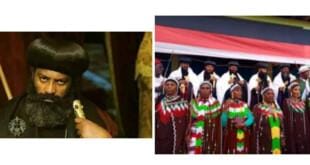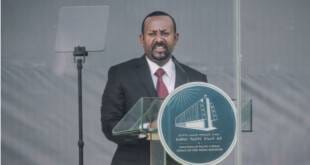March 25, 2013 (US News) — Moving through Addis Ababa is as close to a microcosm of Africa as anywhere on the continent. There is construction everywhere, as African cities are expanding. The streets of Addis are full of smoke and fume from belching autos, usually older models, and like most major cities anywhere, are jammed at rush hour. Goats, stray dogs and pedestrians are to be dodged and stopped for as they move across your vision ahead. There are no traffic signals anywhere in this city of five million, and so all intersections are to be negotiated carefully or by bluff. To those who hesitate, frustration is soon ahead.
Along with the growing numbers of automobiles are more and more pedestrians in the marketplaces, going to school, or just coming into the city to seekjobs. There are the government workers, and like many countries in Africa, the bureaucracy is the largest employer in the country.
[See a collection of political cartoons on the economy.]There are tensions everywhere. There is the tension of cultural change, seemingly inevitable, as pastoral lives disappear in the face of urbanization. There is religious tension as two great religions swirl in immediate proximity of one another, though Ethiopia is managing this better than some places on the continent, and there is the tension of an historically suppressed private sector trying to open up in the face of a bureaucracy afraid of losing control.
Cell phones and blackberries are inoperable in most parts of the city because the government is keeping a tight rein on allowable communication. Ultimately, they can no more keep the lid on communication than they can control the tides of the sea or the phases of the moon above. People look for ways to beat the system rather than work with it, and this is perhaps the greatest tension ahead for many African countries: The tension between the government and the people to be governed. Journalists take care lest they be jailed, and human rights in the western understanding is still not encouraged.
The Ethiopians were suppressed under an extreme and brutal socialist state for decades, and although the suppression has largely been withdrawn by a wiser and more humane leadership, particularly under the late Prime Minister Meles, open dialogue is still not encouraged as much as one might hope. Businesses must renew their licenses to operate every year through a review by the relevant ministry making long-range planning and investment difficult.
[Read the U.S. News Debate: Given The Current Deficit Crisis, Should Foreign Aid Be Cut?]Yet despite all the barriers, small businesses are developing along with major projects. A 65-floor Hyatt Regency, which will be the tallest building in Ethiopia is being built, along with many new office buildings, to be filled with investors and new businesses. China is, as it is in many countries, the leading investor, and Chinese construction is throughout the city and countryside. The new hotel across from the African Union headquarters is being built by a Chinese construction firm, as was the AU headquarters, though the owner is a Saudi-Ethiopian investor.
As usual what is missing are the Americans. One sees few examples of American investment, though investments from the Turks, Arabs, Israelis, and Indians are evident. There are many reasons for this, I suppose, but it does not help us to have reasons not to do things when there are far more overwhelming reasons to be doing what everyone else is engaged in. Our future may depend on it.




